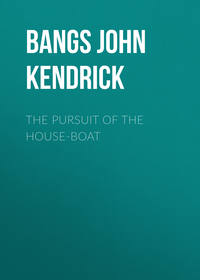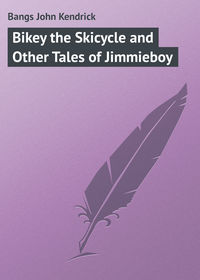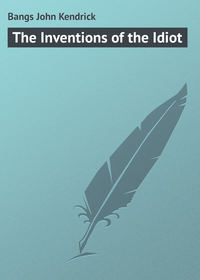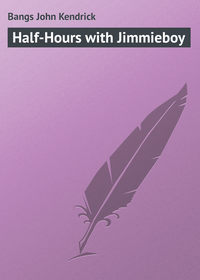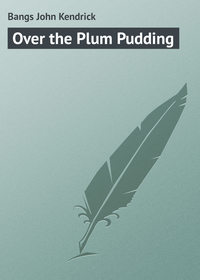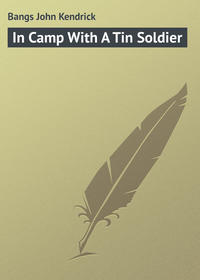 полная версия
полная версияThe Autobiography of Methuselah
"What's the use?" I heard him ask, warmly. "He'll get his name on plenty of I. O. U.'s on his own account before he leaves this glad little earth, without our giving him an autograph that is already on enough over-due paper to decorate every flat in Uncle Zib's model tenements."
The disputation continued with some acrimony for a week, until finally my father put his foot down.
"I'm tired of referring to him as IT," he blurted out one night. "We'll compromise, and name him after me and thee. He shall be called Me for me, and Thou for thee, Selah!"
And so it was that from that day forth I was known as Methouselah, since corrupted into Methuselah.
CHAPTER II
EARLY INFLUENCES
Boys remained boys in those old days very much longer than they do now. The smartness of children like my grandsons, Shem, Ham and Japhet, for instance, who at the age of two hundred and fifty arrogate to themselves all the knowledge of the universe, was comparatively unknown when I was a child. To begin with we were of a different breed from the boys of to-day, and life itself was more simple. We were surrounded with none of those luxuries which are characteristic of modern life, and we were in no haste to grow old by taking short cuts across the fields of time. We were content to remain youthful, and even childish, taking on ourselves none of the superiorities of age until we had attained to the years which are presumed to go with discretion. We did not think either arrogantly or otherwise that we knew more by intuition than our parents had been able to learn from experience, and, with a few possible exceptions, we none of us assumed that position of high authority in the family which is, I regret to say, generally assumed by the sons and daughters of the present. For myself, I was quite willing to admit, even on the day of my birth, that my father, in spite of certain obvious limitations, knew more than I; and that my mother in spite of the fact that she was a woman, was possessed, in a minor degree perhaps, but still indubitably possessed, of certain of the elementary qualities at least of human intelligence. As I recall my attitude towards my elders in those days, the only person whose pretensions to superior attainments along lines of universal knowledge I was at all inclined to resent, was my maiden aunt, Jerusha, my father's sister, who, having attained to the kittenish age of 623 years, unmarried, and having consequently had no children, knew more about men and their ways, and how to bring up children scientifically than anybody at that time known to civilized society. Indeed I have always thought that it was the general recognition of the fact that Aunt Jerusha knew just a little more than there was to know that had brought about that condition of enduring spinsterhood in which she was passing her days. Even her, however, I could have viewed with amused toleration if so be she could have been induced to practice her theories as to the Fifty-seven Best Ways To Bring Up The Young upon others than myself. She was an amusing young thing, and the charming way in which even in middle age—she was as I have already said 623 years old at the time of which I write—she held on to the manners of youth was delightful to contemplate. She always kept herself looking very fit, and was the first woman in our section of the world to wear her hair pompadour in front, running to the extreme psychic knot behind—she called it psychic, though I have since learned that the proper adjective is Psyche, indicating rather a levity of mind than anything else. It should be said of her in all justice that she was a leader in her set, and as President of the Woman's Club of Enochsville was a person of more than ordinary influence, and it was through her that the movement to grant the franchise to all single women over three hundred and forty, resulted in the extension of the suffrage to that extent.
Incidentally I cannot forget the wise words of my father in this connection. He had always been an anti-suffragist, but when Aunt Jerusha's plan was laid before him he swung instantly around and became one of its heartiest advocates.
"It is a wise measure," said he. "Safe, sane and practical, for no single woman will confess to the age of qualification, so that in passing this act we grant the prayers of our petitioners without subjecting ourselves to the dangers of women's suffrage. Remember my son, that it always pays to be generous with that which costs you nothing, and that woman's suffrage is as harmless as the cooing dove if you only take the precaution to raise the age limit high enough to freeze out the old maids."
I should add too that Aunt Jerusha had a way with her that was not without its fascination. To look at her you would never have supposed that she was more than four hundred years old, and the variety of eyes that she could make when there were men about, was wonderful to see. I noticed it the very day I was born, and when I first caught sight of that piquante little glance that now and then she cast in my direction out of the tail of her eye, I began rummaging about in the back of my subconscious mind for the precise words with which to characterize her.
"You giddy old flirt!" was the apostrophe I had in mind at the moment, but, of course, having had no practice in speech I was compelled to forego the pleasure of giving audible expression to the thought.
Unfortunately for me Aunt Jerusha equipped with that intuitive knowledge of what to do under any given circumstances that invariably goes with the status of maiden-aunthood in its acute stages, now assumed complete control of my destinies; and for a time it looked as though I were in a fair way to become what the great Egyptian ruler, King Ptush the Third was referring to in many of his State papers as a "Meticulous Mollycoddle." To begin with, Aunt Jerusha was a strong believer in the New Thought School of Infantile Development, and when I was barely six weeks old she began strapping me on a board like an Eskimo baby, and suspending me thus restrained to a peg in the wall, where, helpless, I was required to hang and stare while she implanted the germs of strength in my soul by reading aloud whole chapters from the inspired chisellings of the popular seer Ber Nard Pshaw, who was to the literature of that period what King Ptush was to statecraft. He was the acknowledged leader of the Neo-Bunkum School of Right Thinking, and had first attracted the attention of his age by his famous reply to one who had called him an Egotist.
"I am more than that," he answered. "I am a Megotist. The world is full of I's, but there is only one Me."
Upon this sort of thing was I fed, not only spiritually but physically, by my Aunt Jerusha. When, for instance, I found myself suffering from a pain in my Commissary Department for the sole and sufficient reason that my nurse had inadvertently handed me the hard cider jug instead of my noon-day bottle of discosaurus' milk, she would rattle off some such statement as this: Thought is everything. Pain is something. Hence where there is no thought there can be no pain. Wherefore if you have a pain it is evident that you have a thought. To be rid of the pain stop thinking.
Then she would fix her eye on mine, and gaze at me sternly in an effort to remove my sufferings by the hot poultice of her own mushy reflections instead of getting the peppermint and the hot-water bag. When night came on and I was restless instead of wooing slumber on my behalf with soft and soothing lullabies, or telling me fairy-stories such as children love, she would say: The child's mind is immature. His conclusions, therefore, are immature. Whence his decisions as to what he likes lack maturity, and consequently to give him that for which he professes to like is equivalent to feeding him on unripe fruit. So we conclude that what he says he likes he really does not like, and to please him therefore, it becomes necessary to give him what he professes to dislike. Ergo, I will read him to sleep with the seventeenth chapter, part forty-nine of the works of Niet-Zhe on the co-ordination of our æsthetic powers in respect to the relative delights of pleasure and pain.
I will do my Aunt Jerusha the credit of saying at this point that her method of putting me to sleep was efficacious. I do not ever remember having retained consciousness past the third paragraph of her remedy for insomnia.
I tremble to think of what I should have become had this fauntleroy process of rearing been allowed to continue unchecked. There were prigs enough in our family already without afflicting the world with another, and it rejoices me to this day to recall that just as we were reaching the point when it was either an early and beautiful demise in the odor of sanctity as a perfect child, or my present eminence as the most continuous human performance on record for me, my father stepped in, reasserted his authority and rescued me from the clutches of my Aunt Jerusha. Returning one day from business, he discovered Aunt Jerusha sitting in a rocking-chair in the nursery before me reading aloud from her tablets, whilst I, as usual, hung strapped and suspended from a hook on the picture moulding. It was my supper-time, and she was feeding me according to the New Thought method of catering. The substance of her discourse was that hunger was an idea, nothing more. She was proving to her own satisfaction at least that I was hungry only because I thought I was hungry, and as father came in she was trying to persuade me that if I would be a good boy and make up my mind that my appetite had been appeased by a series of courses of thought biscuits, spirituelle waffles, and mental hors d'œuvres generally I would no longer be hungry.
"Fill your spirit stomach with the food of thought, Methy, dear," she was saying as my father appeared in the door-way. "Make up your mind that it is stuffed with the crackers and milk of the spirit; that your spiritual bread is buttered with the oleomargerine of lofty ideals, and sugared with the saccharin of your granulated meditations, and you will grow strong. You will become an intellectual athlete, like the great King Ptush of Egypt; a winner in the spiritual Marathon—"
"What are you trying to do with this kid, anyhow?" demanded my father at this point. "Turn him into a strap-hanger, or is this just a little lynching party?"
"Hush, Enoch," protested Aunt Jerusha. "Do not project an unsympathetic thought wave across our wires. I am just getting little Methy into a receptive mood. He is having his supper."
"Supper?" roared my father. "You call that stuff supper? Why, the child is getting thinner than a circus lemonade—"
"In the grosser sense, yes," replied Aunt Jerusha, calmly, after the manner of maiden ladies who are sure of their position. "But look at those eyes. Do they not betoken a great and budding soul within that is hourly waxing in strength and beauty?"
"My dear Jerusha," said my father, unhooking me from the wall and handing me a ripe red banana to eat, "all that you say is very lovely, and I have no doubt that under your administration of affairs the boy will sooner or later become a bully idea, but I hate a man whose convexity of soul has been attained through a concavity of stomach. What this boy needs at this stage of the game is development in what you properly term the grosser sense, I might even go so far as to say the butcher sense as well as the grocer sense. Ham and eggs is what he needs."
And with that he sent out and had a diplodocus carnegii killed, and fed me himself for the next ten days on dainty morsels cut from the fatted calf of that luscious bird. It was thus that I escaped the fate of the over-good who die young and became a factor in the world of affairs rather than a pleasant memory in the minds of my family.
As for my education it was limited, and I may say desultory. In this my Aunt Jerusha was allowed a greater authority than in the matter of my diet, and she early made up her mind that the great weakness of the educational system of the day was the tendency of the teachers in our schools to cram the minds of the young.
"There is no hurry in days like these when people live to be eight or nine hundred years old," she observed to my mother. "There is not very much to be learned as yet. Science is in its infancy, very little history has been made, and as for Latin and Greek, it is entirely unnecessary for Methy to study those languages, because as yet, nobody speaks them, and with the possible exception of that tramp poet, Homer, who passed through here last week on his way West, nobody is using it in literature. Teach him the three Rs and all will be well. Taking the alphabet first and learning one letter a year for twenty-six years he will be able to read and write as early in life as he ought to. If we were more careful not to teach our children to read in their childhood we should not be so anxious about the effects of pernicious literature upon their adolescent morals. If I had my way no one should be taught to read until after he had passed his hundredth year. In that way, and in that way only can we protect our youth from the dreadful influence of such novels as 'Three Cycles, Not To Mention The Rug,' which dreadful book I have found within the past month in the hands of at least twenty children in the neighborhood, not one of whom was past sixty."
It was thus resolved that my education should proceed with due deliberation and even as Aunt Jerusha had suggested, I was taught only one letter a year for the first twenty-six years of my life, after which I took up addition, multiplication, short and long division and fractions. My father would not permit me to learn subtraction.
"It is a waste of time," said he. "Children subtract by intuition. Put in all your time teaching Methy how to add and multiply."
My history was meagre, because as Aunt Jerusha had said, history itself was meagre. There had not even been a flood, much less a first, second, or third Punic War. Nobody in my time had ever heard of Napoleon Bonaparte or George Washington or Julius Cæsar, or Alexander, save a few prophets in the hills back of Enochsville, in whose prognostications few of their contemporaries took any stock; as was indeed not unnatural, since when they attempted to prophesy as to the weather they showed themselves to be rather poor guessers. If a man prophesies a blizzard for to-morrow and to-morrow comes bringing with it the balmy odors of Spring, no one is likely to set much store by his prognostications concerning the possible presidential candidacy of a man named Bryan six or seven thousand years later. Consequently the only history with which I took the trouble to familiarize myself was that which ante-dated my birth, and even that was somewhat hazy in the minds of historians. My predecessors in the patriarchal profession were a reticent lot, inherited no doubt from our original ancestor Adam, who could never be got to talk even to members of his immediate family on the subject of his early years. True, it is generally believed that he had no early years, and that he was born on his fifty-ninth birthday, but even as to that he would not speak. I shall never forget the look on his face when I asked him at a Thanksgiving dinner one year if he had ever been a monkey with a tail. He rose up from the table with considerable dignity, and leading me out into the wood-shed turned me over on his knee and subjected me to a rather severe course of treatment with a hair-brush.
"There, my lad," he observed when he had done. "If I had had a tail that is about where I should have worn it."
I never referred to the subject again.
CHAPTER III
SOME REMINISCENCES OF ADAM
The concluding paragraphs of my last chapter have set my mind running upon the subject of my original forebears, and inasmuch as I have decided to write these memoirs of mine along the lines of least resistance, it becomes proper that I should at this time, put down whatever happens to be in my mind. To speak frankly I never really could get up much of a liking for old grandfather Adam. He was as devoid of real humor as the Scottentots, and simply because by a mere accident of birth he became the First Gentleman of Europe, Asia and Africa, he assumed airs that rendered him distinctly unpopular with his descendants. He considered himself the fount of all knowledge because in the early days of his occupancy of the Garden of Eden there was no one to dispute his conclusions, and the fact that he had been born without a boyhood, as we have already seen at the age of fifty-nine, left him entirely unsympathetic in matters where boys were concerned. I shall never forget a conspicuous case in point demonstrating his utter lack of comprehension of a boy's way of looking at things. He was on a visit to our home at Enochsville, and on the night of his arrival, having called for a glass of fermented grape-juice, thinking to indulge in a mere pleasantry, I brought him a tumblerful of sweetened red ink, the which he gulped down so avidly that it was not until it was beyond recall that he realized what I had done; and when in his wrath he called for an instant remedy and I brought him the blotting paper, instead of smiling at the merry quality of my jest, he pursued me for two hours around my father's farm, and finally cornering me in the Discosaurus shed, larruped me for twenty full minutes with a paddle pulled from a prickly cactus plant in my mother's drawing-room, thorn side down. Indeed most of my early recollections of the old gentleman are inseparably associated with a series of chastisements which, even as he had prophesied when administering them, I have not been able to forget, although I cannot see that any of them ever resulted in a lasting reformation of my ways. On the contrary the desire to see what new form of thrashing his disciplinary mind could invent led me into devising new kinds of provocation, so that for a great many years his visits to our house were a source of great anxiety to my parents. His view of me and my ways were expressed with some degree of force to our family physician who, when at the age of a hundred and fifty-three I came down with the mumps, having summoned the whole family and said that I would burst before morning, was met by a reassuring observation from Adam that he wouldn't believe I was dead even if I had been buried a year.
"It is the good who die young, Doctor," he said. "On that principle this young malefactor will live to be the oldest man in the world."
A curious example of his gift of prophecy!
Adam's table manners were a frequent source of mortification to us all. The free and easy habits of the Garden period clung to him throughout his life, and under no circumstances could he be induced to use either a fork, a knife or a spoon, and even on the most formal occasions he absolutely refused to dress for dinner.
"Fingers were made before forks," he said, "and as for spoons I have no use for such frills. I can eat my peas out of the pod, and as for soup it tastes better out of a dipper anyhow."
As for the knives, his dislike of them was merely in their use at table. He was fond of knives of all sorts, and he regarded them always as his legitimate spoil whenever he dined anywhere, pocketing every one he could lay his hands on with as much facility as the Egyptian, and Abyssinian drummers who visited our section of the country every year made off with the spoons of our hostelries. Nor could we ever appeal to him on the score of etiquette. Any observation as to the ways of our first families was always met by a cold but quick response that if there was any firster family than his own in all creation, he couldn't find its name in the social register. Indeed the old gentleman was rather inclined to be very snobbish on this point, and when any of his descendants chose to take him to task for the crudeness of his manners he was accustomed to look them coldly over and retort that things had come to a pretty pass when comparatively new people ventured to instruct the oldest of the old settlers as to what was or was not good form. The only person who ever succeeded in bowling him over on this point was Uncle Zib, hitherto referred to as the billionaire member of our family, who, after listening to a long and somewhat supercilious discourse from Adam on the subject of family, turned like a flash and asked:
"And who pray was your grandfather?"
The old gentleman flushed deeply, and for once was silent, being as I have already intimated rather sensitive, and therefore inclined to reticence on the score of his ancestry.
He took a great deal of pride in his success as a namer of animals, but as my grandson Noah remarked several hundred years later, it was a commonplace achievement after all.
"A dog is a dog, and a cat is a cat, and a horse is a horse. Any fool would know that, so what virtue there was in his calling the beasts by their real names I don't quite see," said Noah.
I am disposed, however, to give the old fellow the credit that is his due for making so few mistakes. That he should instantly be able to tell the difference between a dromedary and a camel without any previous instruction, strikes me as evidence of a more or less remarkable intuition, the like of which we do not often find to-day, and his dubbing that long-eared, four-footed piece of resistant uselessness the Ass an ass, always seemed to me to be a master stroke, although my father used to say that his greatest achievement lay in correctly designating the pig at first sight.
"If there is any animal in the whole category of four-legged creatures that more thoroughly deserves to be called a pig than the pig, I don't know what it is. He looks like a pig, he behaves like a pig, and he eats like a pig—in fact he is a pig, and Adam never did anything better than when he invented that name and applied it."
The old gentleman was present when my father said that, and his face flushed with pleasure at his words of praise.
"Thank you, Enoch," he said. "I am rather proud of it, but I think I did quite as well when it came to the hen. Anything more aptly answering to the word hen in all its various shades of meaning than the hen itself I don't know, but it took me a full week to reason the thing out. It was not until I heard its absurd cackling over the laying of a strictly fresh egg, strutting about the barn-yard like a feathered Napoleon Bonaparte, and acting altogether as though she were the winner of a Twentieth Century Marathon race that it dawned on me that the creature was a hen, and could never be anything else than a hen. Mother wished me to call her an omelette, the feminine form of an om, as she expressed it, but I had already named the rooster, and the bird seemed so exactly like a rooster that I declined to make any changes."
"I don't see," put in Uncle Zib at this point, "where you got the word hen from. That is the wonder of it to my mind."
"Oh," laughed Adam, "that was easy, my dear Zib. I got it from an inspection of the egg."
"The egg?" demanded Uncle Zib.
"Certainly," replied Adam. "You see the minute I picked up the egg and looked at it closely, I saw that it was a hen's egg, and there you are."
After all it seemed very simple.
I have spoken of his abhorrence of dress. He carried this to an extreme degree and to the end of his life predicted dire things from the tendency of his descendants toward sartorial display. I shall never forget the lucid fashion in which he presented the situation to my father once while we were camping out one night on Mount Ararat, after a day's hunting. He was seated on a woody knoll skinning a pterodactyl for our supper.
"I tell you, Enoch," he said, "and if you don't mark my words you'll wish you had, these new fangled notions that are coming along, and affecting the whole of modern society in respect to what you are pleased to call dress, are going to result sooner or later in trouble. I can clearly see even if you cannot, that the new ideas as to clothes are breeders of extravagance. As things were in my young days anybody who felt the need of a new costume of one kind or another had only to go out into the woods and pick it. If your great-great-great-grandmother or I, for instance, wanted a new Spring suit we'd go hand in hand together to the orchard, and in the course of a half hour's steady work would fit ourselves out with a wardrobe that would have made this Queen of Sheba that the prophets are foretelling, look like thirty clam-shells; and what is more, a Spring costume was indeed a Spring costume and nothing else, for it was made of the freshest of the vernal leaves, beautiful in their early greens, and decorated here and there with a bit of a blossom that gave the whole a most fetching appearance. And so it was with the other seasons. For summer we used leaves of the vintage of July and August, deeper in their green, with the summer flowers for decoration. Nothing ever so stirred the heart of man as Mother Eve decked out in her gown of rose leaves, or hollyhocks; and occasionally when we went travelling together dressed in our suits of hardy perennials, we were the cynosure of all eyes. In the Autumn the rich red of the maple gave us an aspect of gayety in respect to our clothes that was most picturesque; and then when the winter blasts began to blow, our garments of pine, cedar and hemlock were not only warm, but appropriate and becoming. It is true that clothes made of hemlock were not altogether comfortable at first, having some of the prickly qualities of the hair-shirt, but the very tittilation of the epidermis by their pointed spills, sharp sometimes as a needle, served to keep our blood in circulation, and consequently at all times warm and glowing. And it all cost us nothing more than the labor of the harvest, but now, all is different. The use of costly fabrics, woven stuffs, silks, satins and calicos, has introduced an added element of expense into our daily lives, and all to no useful purpose. Take your Aunt Jerusha, for instance. Where Mother Eve enjoyed as many different costumes as there were trees in the country without cost, all of them becoming, and wholly adequate, your Aunt Jerusha has to be satisfied with three or four gowns of indifferent fit, made by the village seamstress at an average cost of thirty or forty dollars apiece. A sheath-gown, costing Jerusha seventy-five dollars, in the distance, gives no more of an impression in the matter of figure to an admiring world than your original grandmother used to make without any further sartorial embellishment than an ostrich feather in her hair, and as for the men—well, if you see any value in the change in men's garments over those which prevailed in my day, you can see what I cannot, and what is going to be the result? The time will come when tailors' bills will be regarded as a curse. Fathers of families who, under the scheme of dress invented by myself, could keep a large number of growing boys appropriately clad, will sooner or later be forced into bankruptcy by the demands of tailors under these new methods now coming into vogue. In the train of this will come also a love of display, and in the course of years you will find men judged not by the natural stature of their manhood, but by the clothes they wear, to the everlasting deception of society. By the use of a little expert padding, building up here and there, a miserable little human shoat will be able to appear in all the glory of a gladiator. A silk outer garment will cover the shoddy inner nature of a bit of attleboro humanity so effectively that you will hardly be able to tell the real thing from the bogus, and many a man lured into matrimony by the charms of an outward Venus, will find after marriage that he has tied himself up for life to a human hat-rack, specially designed by a clever dressmaker, to yank him from the joys of a contented celibacy into the thorny paths of hymeneal chaos.


